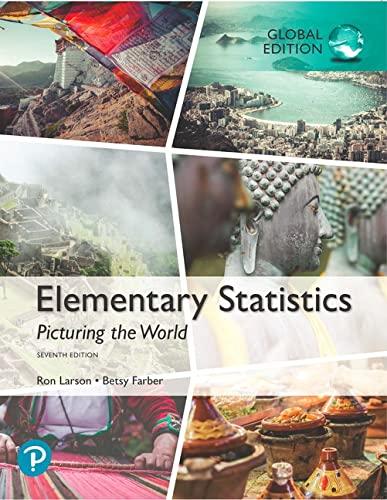Probability affects decisions when the weather is forecast, when medications are selected, and even when players are
Question:
Probability affects decisions when the weather is forecast, when medications are selected, and even when players are selected for professional sports teams.
Although intuition is often used for determining probabilities, you will be better able to assess the likelihood of an event by applying the rules of probability.
For instance, you work for a real estate company and are asked to estimate the likelihood that a particular house will sell for a particular price within the next 90 days. You could use your intuition, but you could better assess the probability by looking at sales records for similar houses.
One common abuse of probability is thinking that probabilities have “memories.”
For instance, the probability that a coin tossed eight times will land heads up every time is about 0.004. However, when seven heads have been tossed in a row, the probability that the eighth toss lands heads up is 0.5. Each toss is independent of all other tosses. The coin does not “remember” that it has already landed heads up seven times.
A famous instance of this abuse happened at a casino in Monte Carlo, Monaco, in 1913. After a roulette wheel landed on black 15 times in a row, people started rushing to bet on red, thinking that the wheel was bound to land on red soon. The wheel kept landing on black, and players doubled and tripled their bets, using the same reasoning. The wheel ended up landing on black a record 26 times in a row, costing players millions.
A study by economists Daniel Chen, Tobias Moskowitz, and Kelly Shue found evidence that the gambler’s fallacy occasionally leads baseball umpires, loan officers, and judges in refugee asylum courts to make mistakes. For instance, when loan officers have approved five loan applications in a row, they might think that six deserving loans in a row is unlikely and reject the sixth application based on a minor flaw when objectively it should be approved. The study concluded that up to 9% of loan decisions are influenced by this fallacy.
Similarly, when judges are reviewing a request for asylum, they might be more likely to deny the case if they approved the last two cases. The authors of the study estimated that as many as 2% of asylum cases may be affected. Although not as serious an injustice as the first two examples, the study also found that baseball umpires are about 1.5% less likely to call a pitch a strike when they called the previous pitch a strike. For decision makers such as judges to make ethical decisions, they must attempt to view each case as independent from previous cases.
Questions
A “Daily Number” lottery has a three-digit number from 000 to 999. You buy one ticket each day. Your number is 389.
1. What is the probability of winning next Tuesday and Wednesday?
2. You won on Tuesday. What is the probability of winning on Wednesday?
3. You did not win on Tuesday. What is the probability of winning on Wednesday?
Step by Step Answer:

Elementary Statistics Picturing The World
ISBN: 9781292260464
7th Global Edition
Authors: Betsy Farber, Ron Larson





